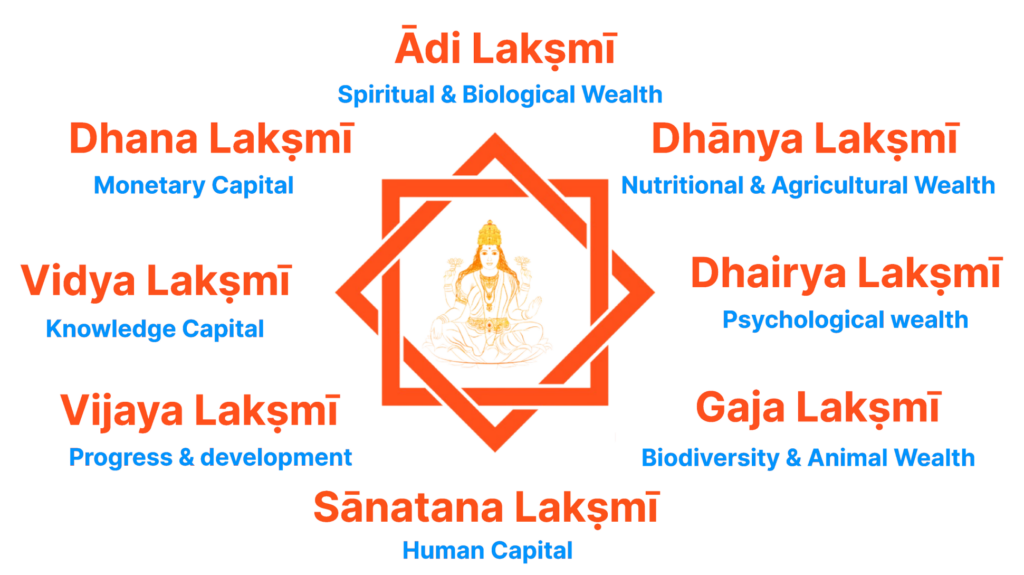Concept of Ashtalakṣmī: Holistic Idea of Wealth for an Individual

In a world where wealth is often equated with material success, the concept of Ashtalakṣmī offers a refreshing, more holistic view of what it truly means to be wealthy. Ashtalakṣmī, derived from the Sanskrit word ‘Ashta’ meaning eight, and ‘Lakṣmī’ referring to the goddess of wealth, represents the eightfold manifestations of Goddess Lakṣmī, each embodying a different aspect of wealth. These forms of Lakṣmī are not just material but encompass spiritual, emotional, and intellectual abundance, guiding individuals toward a more balanced and fulfilling life.
What is Ashtalakṣmī?
Ashtalakṣmī is the divine embodiment of wealth in its many forms, and it underscores the idea that wealth is not confined to money alone. Instead, it represents the prosperity and well-being in all areas of life, including knowledge, courage, food, family, and victory. By worshipping the eight forms of Goddess Lakṣmī, devotees believe they can achieve a more integrated and harmonious existence.
The eight forms of Ashtalakṣmī are:
- Adi Lakṣmī (Primeval Lakṣmī) – The memory of our source, Adi Lakṣmī connects us to our origin, granting strength and calmness. She represents the unending nature of wealth, symbolizing a wealth that is continuous, both spiritually and materially. By invoking Adi Lakṣmī, we reconnect to our deeper selves and the larger universe, helping us overcome feelings of insecurity and doubt.
- Dhana Lakṣmī (Wealth of Material Prosperity) – Dhana Lakṣmī is the most commonly understood form of wealth—money and gold. She is the goddess of financial prosperity, ensuring abundance in material possessions. However, true wealth, as understood through this form, is not limited to currency but includes everything that sustains life, such as nature, health, and virtues.
- Dhanya Lakṣmī (Wealth of Grain) – Dhanya Lakṣmī blesses us with food, grain, and nourishment. She is the goddess of agricultural wealth, ensuring the abundance of food that sustains the body. Beyond material abundance, she reminds us of the spiritual richness that comes from nourishment—both physical and emotional.
- Dhairya Lakṣmī (Wealth of Patience and Courage) – Dhairya Lakṣmī embodies the wealth of inner strength, patience, and resilience. In a world where challenges are inevitable, she grants the courage to endure difficulties, the patience to wait for the right opportunities, and the strength to stay grounded in both good and bad times. This form of wealth is essential for personal and spiritual growth.
- Gaja Lakṣmī (Wealth of Animal and Royal Power) – Gaja Lakṣmī is the giver of animal wealth, such as cattle, elephants, and horses. She also symbolizes the power of royalty and authority. In a broader sense, she represents the wealth derived from leadership, power, and the responsibility that comes with it. The grace of Gaja Lakṣmī enables us to harness our power wisely and with compassion.
- Santana Lakṣmī (Wealth of Progeny) – Santana Lakṣmī bestows the wealth of children, family, and legacy. She emphasizes the importance of progeny and creativity in perpetuating our legacy, whether it is through biological children or creative and intellectual offspring. This form highlights the wealth of relationships and the deep connection we share with others.
- Vijaya Lakṣmī (Wealth of Victory) – Vijaya Lakṣmī is the goddess of success, victory, and triumph. Whether it’s victory in battles or in the daily struggles of life, she ensures we remain successful in all our endeavors. Her blessings inspire perseverance, confidence, and the courage to overcome obstacles and emerge victorious.
- Vidya Lakṣmī (Wealth of Knowledge) – Vidya Lakṣmī is the goddess of knowledge, skills, and wisdom. She represents the intellectual wealth that enriches our minds and guides our actions. In today’s rapidly evolving world, the wealth of knowledge is perhaps one of the most valuable resources, offering us the ability to innovate, learn, and adapt.
The Holistic Wealth of Ashtalakṣmī
Ashtalakṣmī teaches us that wealth is a multi-dimensional concept. It’s not just about financial resources; it encompasses everything that contributes to our well-being—physical, mental, emotional, and spiritual. The eight forms of Lakṣmī guide us toward a balanced life,